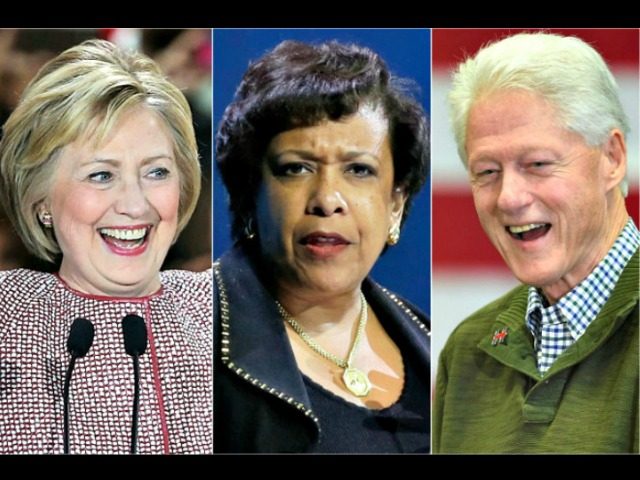Attorney General Loretta Lynch deflected and evaded questions from Republicans on the House Judiciary Committee Tuesday during her more than three hours of testimony centered on her decision to accept the recommendation of FBI Director James B. Comey Jr., not to charge former secretary of state Hillary Clinton in relation to her private email scheme, while at State.
“The American people,” said Rep. Robert Goodlatte (R.-Va.), the committee chairman, in his opening remarks, “expect government officials to abide by the law like everybody else; and to be reprimanded when they break the law. That is not the case for former secretary of state Hillary Clinton.”
When the four-hour hearing was over, Goodlatte was furious.
“It’s clear that, a little over an hour into today’s hearing, Attorney General Lynch has no intention of answering any of our questions regarding the Department’s decision not to charge former Secretary of State Hillary Clinton, even the most basic questions about the legal elements the government is obligated to prove in a criminal prosecution,” he said.
“Instead of providing the Judiciary Committee with the candor provided to Congress last Thursday by FBI Director Comey, Attorney General Lynch instead is dodging any responsibility to be forthright to Congress by referring members to the statements of her subordinate,” he said.
As the hearing progressed, time and time again Republicans tried to elicit the most basic answers, but Lynch would not be tied down.
The chairman laid out a timeline of events and connections for the attorney general. “Monday, June 27, Attorney General Lynch you met privately with former President Bill Clinton aboard your plane on the tarmac of Phoenix airport, despite the fact that his wife was the target of an ongoing investigation.”
Not only was the president’s wife under investigation, but there is reason to believe that the FBI, which is under the jurisdiction of Lynch as the head of the Department of Justice, is also investigating the Clinton Foundation, founded by the former president, who sits on its board of directors, he said.
“Five days later, the FBI held its only meeting with Secretary Clinton after a year-long investigation, he said. “Three days later, on the first day back from a holiday weekend, Director Comey publicly announced that he was not recommending charges against Secretary Clinton and a mere 24 hours later Attorney General Lynch, you issued a press release announcing that no charges would be brought against Secretary Clinton.”
Lynch was ready. Lynch came prepared with this answer:
“While I understand that this investigation has generated public interest, as attorney general it would be inappropriate for me to comment further on the underlying facts of the investigation or the legal basis for the team’s recommendation. But, I can tell you that I am extremely proud of the tremendous work of the dedicated prosecutors and agents on this matter,” Lynch said.
It was a construct she would repeat dozens of times.
When Lynch was asked about Comey, she told the congressman she would have to refer him to Comey. When Lynch was asked about the State Department procedures or email or its handling of classified information, she would refer the congressman to State. Asked to interpret the federal law Clinton has been accused of violating, Lynch replied: “I think the statue speaks for itself.”
In one exchange, Rep. Darrell Issa (R.-Calif.) asked repeatedly if the team that made its recommendation to Lynch included any political appointees.
They were all career prosecutors and agents, she said.
“Your answer is ‘no,’ there were no political appointees?” he asked again.
They were all career prosecutors and agents, she said.
One congressman, Rep. Trent Franks (R.-Ariz.) just gave up in the middle of his questions.
Franks said he had up to 10 questions ready for the hearing, but once he heard her first answer he knew it was a waste of time going up against a world-class stonewaller.
“She is totally gifted at it,” he said. “I have been on this committee for 12 years and never have I seen such an awe-inspiring and clear dissemination.”
The congressman said he did not have a chance and he saw other Republicans, many of them former prosecutors, getting the same treatment.
“It was so one-sided, it was really kind of sad,” he said.
“It does not surprise me at all,” said Rep. Mimi Walters (R.-Calif.). “I think she realizes she is going to be asked a lot of questions about Secretary Clinton and the email scandal and I think she is trying her best to say as little as possible.”
Lynch’s serial evasions were a sharp contrast to the July 7 hearing when Comey came to testify on Capitol Hill, said Rep. Blake Farenthold (R.-Texas).
“I prefer to see cooperation in federal employees, not stonewalling,” he said. “The American people pay her salary and they deserve to have answers to questions about her thought process in choosing to ignore what I think are clear violations of the law that other people faced serious consequences for.”
Goodlatte said it was Lynch who created the situation because she insisted on remaining in the decision chain as the final authority–despite the appearances of impropriety and the obvious conflicts of interest.
“If Attorney General Lynch doesn’t want to answer questions about the investigation, then she should have appointed a special prosecutor at the start of the investigation,” he said.
“She never even sought to recuse herself, despite the fact that Secretary Clinton is the wife of her former boss, President Bill Clinton. It’s equally troubling that she met privately with former President Clinton just days before FBI Director Comey announced that he does not recommend criminal charges be filed against Secretary Clinton. The American people deserve transparency about this investigation.”

COMMENTS
Please let us know if you're having issues with commenting.